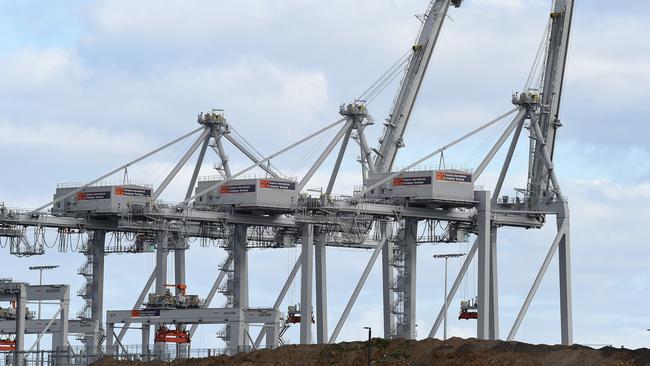QIC-led consortium to win auction for Port of Melbourne
A QIC-led consortium including China’s sovereign wealth fund will pay $9.7bn in total to lease the Port of Melbourne.

China has snapped up 20 per cent of Australia’s biggest port, the Port of Melbourne, as part of a $9.7bn privatisation deal unveiled by the Victorian Government today.
CIC Capital, China’s $200bn sovereign wealth fund, will hold the stake through a fund managed by one of the winning Lonsdale consortium’s members, global fund manager GIP.
It comes as a Queensland Investment Corporation-led consortium has won the contest to buy the Port of Melbourne, beating an IFM-backed group of bidders in a closely-fought contest.
The $9.7bn price for the 50-year lease of the port — Australia’s busiest — includes a 15-year prepayment of an $80m-a-year licence fee.
Sources close to the deal said the winning consortium, which also includes Queensland’s QIC, the Federal Government’s Future Fund and Canadian pension fund OMERS, narrowly outbid a rival group headed by Macquarie Infrastructure and Real Assets and Industry Funds Management.
The Future Fund is to hold 20 per cent, as is QIC’s global instructure fund, which includes an investment from America’s Golden Reef Infrastructure Trust.
GRIT is in turn invested in by US pension funds.
GIP is managing 40 per cent of the total ploughed into the deal, made up of CIC’s stake and 20 per cent held by Korean pension fund NTS and other investors.
The remaining 20 per cent is held by OMERS.
Victorian Treasurer Tim Pallas said the port was the premium asset in its class in Australia, but the higher-than-expected price was down to some good fortune. Forecasts for the deal had ranged from $6bn to $8bn.
“I think we’ve been very lucky in terms of timing ... couldn’t have picked a better time to go to the market,” Mr Pallas told reporters.
Premier Daniel Andrews said the Lonsdale consortium’s bid had passed competition and foreign investments checks.
“This is a massive vote of confidence ... every Victorian should take great pride in the price that has been paid for this asset,” Mr Andrews told reporters. More than $970 million of the purchase price will be spent on regional and rural infrastructure projects.
Mr Pallas signed contracts this morning, with commercial close expected on October 31.
In a statement, the winning consortium described the port as “ a strategic link between Australia and its major trading partners”.
It said it planned to bring significant operational expertise to the port, submitting a long-term development plan, which was underpinned by a strong commitment to safety, governance, productivity and sustainability.
“The Port of Melbourne is a high quality asset and an important link between Australia and its trading partners,” said Future Fund chair Peter Costello.
“We’re delighted to invest in it and to add it to our portfolio of Australian and global infrastructure assets.
“It will be an important contributor to our long-term investment objectives as Australia’s sovereign wealth fund.”
QIC Global Infrastructure head Ross Israel described the port as core infrastructure — “a critical and strategic piece of the Victorian and Australian logistics supply chain”.
“Our consortium has developed a long-term vision and business plan. Leveraging our global port and regulated asset experience, QIC is focused on delivering long-term stewardship and improvements to the port and for its users, “ he said.
“We believe this investment brings significant diversification benefits for our clients as a landlord port with a well-defined regulatory regime in a globally-scarce infrastructure subsector.”
GIP Australia partner Russell Smith said GIP was looking forward to supporting the future growth of the Port of Melbourne by applying industry best practice and using specialist knowledge.
“GIP looks forward to bringing to bear our strong port and rail industry expertise to drive forward the efficiency and capacity of the Port of Melbourne and focus on the necessary transformational change in the road/rail mix servicing the freight task moving through the port to the benefit of all stakeholders.”
Final bids were due on Friday ahead of the announcement of a long-term lease to operate one of the world’s busiest ports.
Opinions had been divided on Port of Melbourne’s final valuation, with some claiming the clear regulatory regime and potential revenue growth from one of the country’s biggest container ports would elevate its valuation to $8 billion or higher.
Others pointed out the comparatively heavy regulation of port charges would keep a lid on the price, with the government to reap between $6bn and $7bn.




To join the conversation, please log in. Don't have an account? Register
Join the conversation, you are commenting as Logout